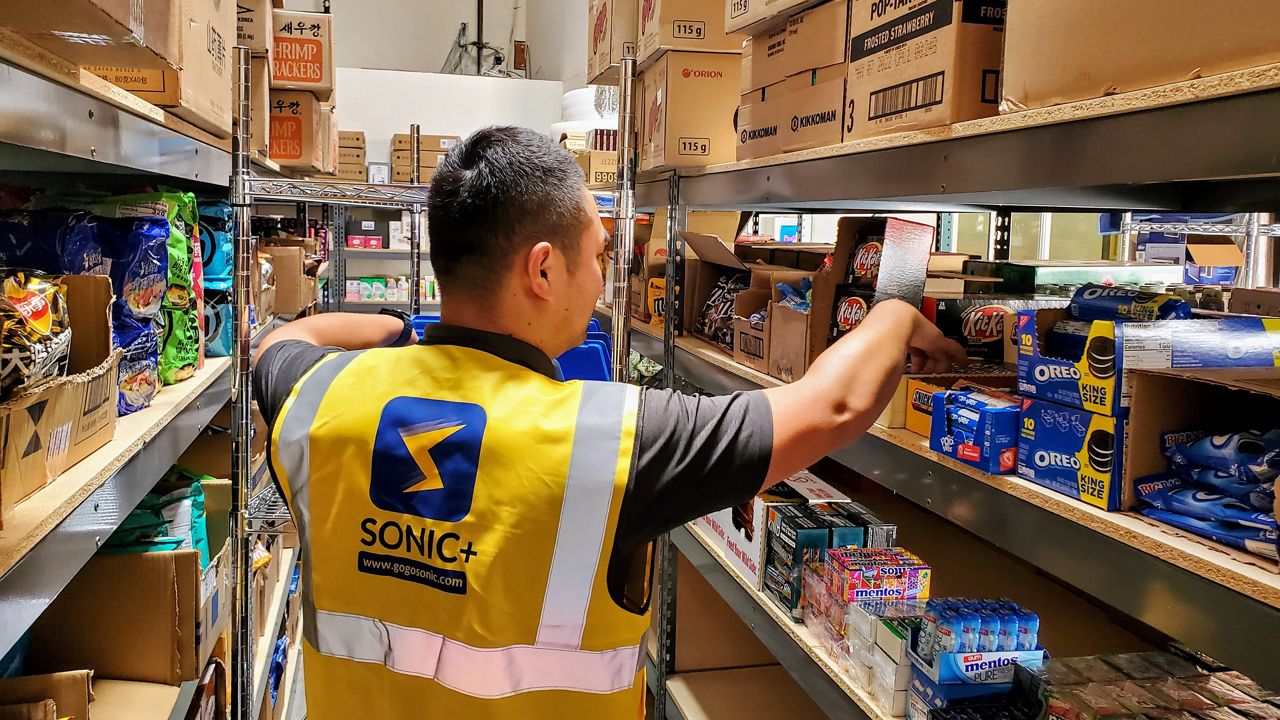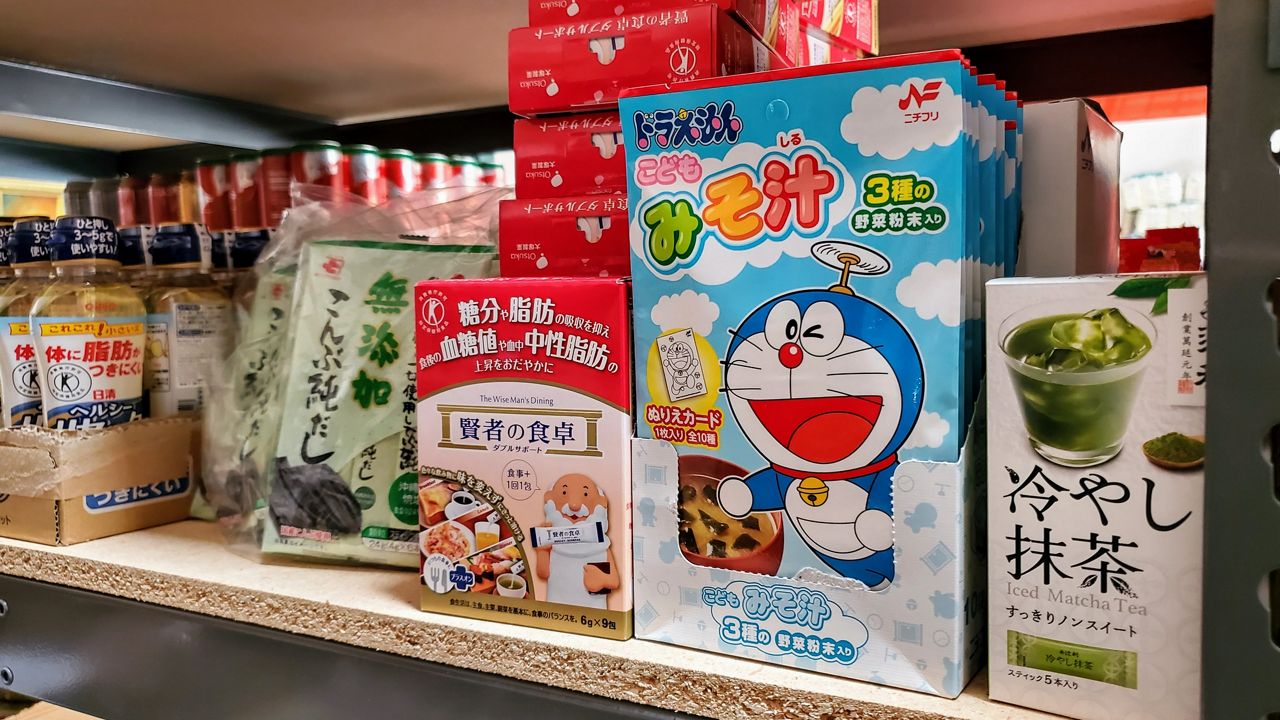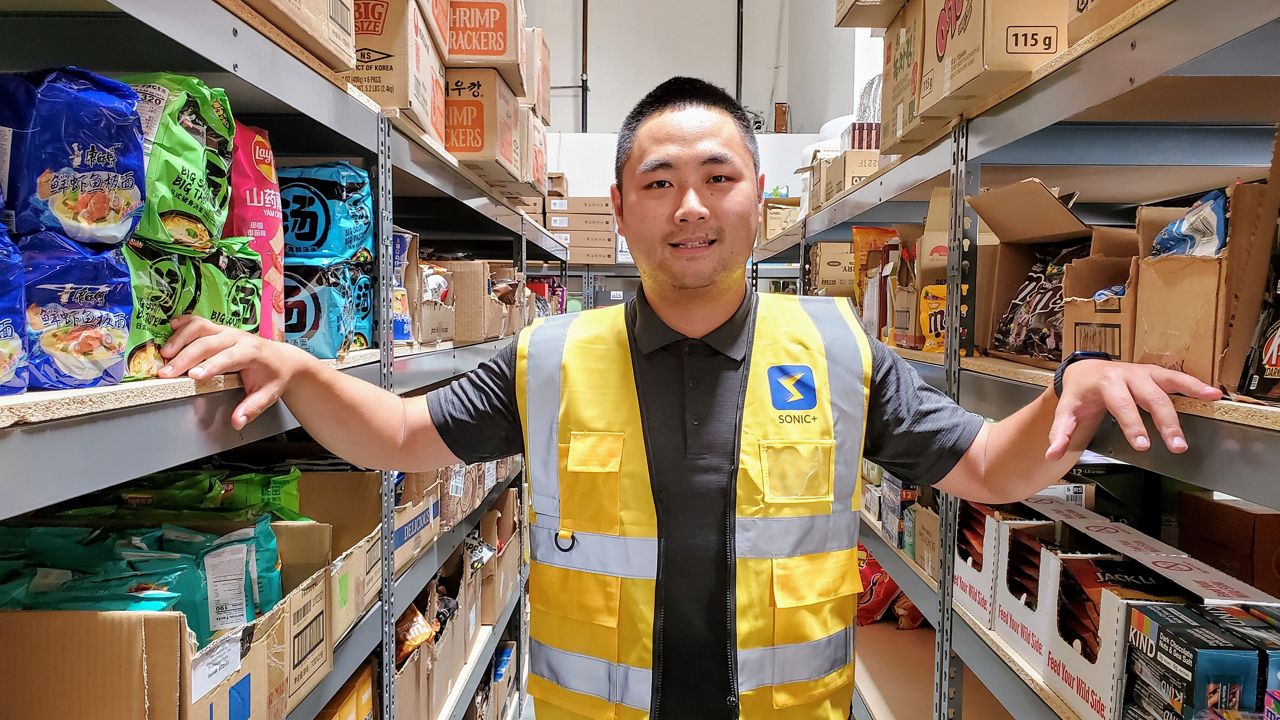IRVINE, Calif. — There were times at Michigan State University that Jay Zhao wished he could have a warm meal and drink delivered to him instantly.
Zhao said it was always hard to find the will to go out when the Michigan weather turned.
"The winters were so freezing," he said, hugging himself as if he felt the cold weather.
Zhao, 31, doesn't have to worry about dealing with frigid cold weather living in Irvine, but he always remembered that need for instant delivery service.
So, with his background in supply chain and logistics, Zhao, last year during the coronavirus pandemic, co-founded Sonic+, an app-based, on-demand e-grocery delivery service that, he says, can deliver goods to a customer's home in as little as 37 minutes.
Zhao named his company after Sonic The Hedgehog, an animated anthropomorphic blue hedgehog in Sega video games and movies known for his lightning-quick speed.
Zhao leased a 2,200 square foot warehouse, which he calls a micro-fulfillment center, and stocked it with fresh goods from cookies, drinks, vegetables to whole milk.
"I named my company Sonic and added a plus because I want my delivery service to be faster than him," Zhao told Spectrum News from inside his micro-fulfillment center in Irvine. "Currently, we are delivering within a 15-miles radius around Irvine. We will cover more cities when we expand our MFC."

Zhao is attempting to capitalize on a growing trend: Online grocery shopping and have it delivered instantly to the customer's door.
The coronavirus pandemic and pandemic-related government health restrictions that forced many consumers to stay at home and prevent large gatherings have changed consumer behavior and accelerated the demand to shop online – even for groceries.
Groceries and picking their products and feeling the texture of vegetable and fruit produce has always been something people have preferred to do themselves. But the convenience of staying at home and shopping online and having someone else do it for them appears to have changed that, researchers said.
According to Supermarket News, citing Coresight Research, about 60% of consumers surveyed in the United States are now buying groceries online. That same number of consumers, Coresight found, will continue to buy their groceries online even when the pandemic ends.
"The health crisis was a significant catalyst in accelerating online grocery adoption and transformation in 2020 and into 2021," wrote Deborah Weinswig, founder and CEO of Coresight in the study. "With the pandemic keeping consumers at home and away from stores (and restaurants), we estimate that total U.S. food and beverage e-commerce sales grew to $55.5 billion in 2020, up 81.1% year over year — a vastly greater increase than any recent year."
Weinswig expects the online grocery shopping trend to continue in 2021 and beyond and that "grocers have a unique opportunity to capitalize on shifting trends and the still-evolving e-commerce consumer experience."
Investors and delivery companies have noticed the trend for some time and expanding their footprint.
Last month, Doordash partnered with Albertsons Cos. to offer on-demand grocery delivery services from any of their more than 2,200 stores across 34 states. The partnership will allow people to order through Doordash from any Albertson brands, including Albertsons, Vons, Pavilions, and Safeway.
Uber fully acquired grocery delivery startup Cornershop in an all-stock deal.
And Instacart, the leader in this space since 2012, is expanding to Quebec, Canada, and announced they would begin accepting SNAP and EBT as a payment method in Oklahoma.
Brick Meets Click, a site that studies the modern grocery business, found that the online grocery market finished May with $7 billion in sales. Nearly 67 million households placed an average of 2.8 grocery orders during the month.
The delivery and pickup segment, which includes first and third-party delivery services, curbside or in-store pickup, accounted for three-quarters, roughly $5.3 billion of total online grocery sales for May, the Brick Meets Click/ Mercatus Grocery Shopping Survey found. Groceries delivered directly to a customer's home ate up the rest of online grocery sales.
Although the data show a 16% drop from last year, which was two months into the pandemic, the research still suggests consumers' growing preference for online grocery shopping.
"May's results show the market retains 70% of the incremental gains generated versus the record COVID high of $9.3 billion, illustrating that much of the gain propelled by the pandemic has stuck around," said David Bishop, partner and research lead at Brick Meets Click, in a news release.

For Zhao, he sees the potential and believes his app-based grocery delivery service can find a place in the burgeoning industry. The Sonic+ app is currently available free on the Apple app store. An Android version will come out later this month, he said.
Zhao said one thing that will differentiate his company from its competitors is marketing, products and cost. Unlike other on-demand grocery companies that have partnered with mainstream grocery brands, Zhao is targeting the growing Asian and university student population in Irvine.
"We're not limited to just Asians, but 70% of our customers are Asians," he said.
His micro-fulfillment center reflects this. Inside the warehouse are goods more commonly found in Asian grocery stores – Japanese curry, Genki Forest drinks, iced matcha tea, dry seaweed snacks, ramen, prawn crackers and more. The warehouse currently contains more than 500 items, and he plans to increase it to 800 soon, he said.
Grocery delivery service can cost as much as $10 from some companies and take several hours to deliver.
Zhao said Sonic+ charges $4.99 for orders under $49, and anything over will be free. Customers will also receive their products within an hour, he said, adding that he has in-house staff drivers doing the deliveries.
So far, he receives about 40 to 50 orders a day with the customer's average ticket price at $85, he said.
And once UC Irvine students come back to campus, Zhao plans to extend his delivery service to midnight.
"Once the students come back, there is going to be a huge demand for delivery at night, but not many grocery stories can fulfill their needs," he said.
Zhao's goal with Sonic+ is to grow and expand to different cities.
"Because of COVID, people's behaviors are changing," he said. "They want mobile ordering and rapid delivery."
"This is the future," he said.



